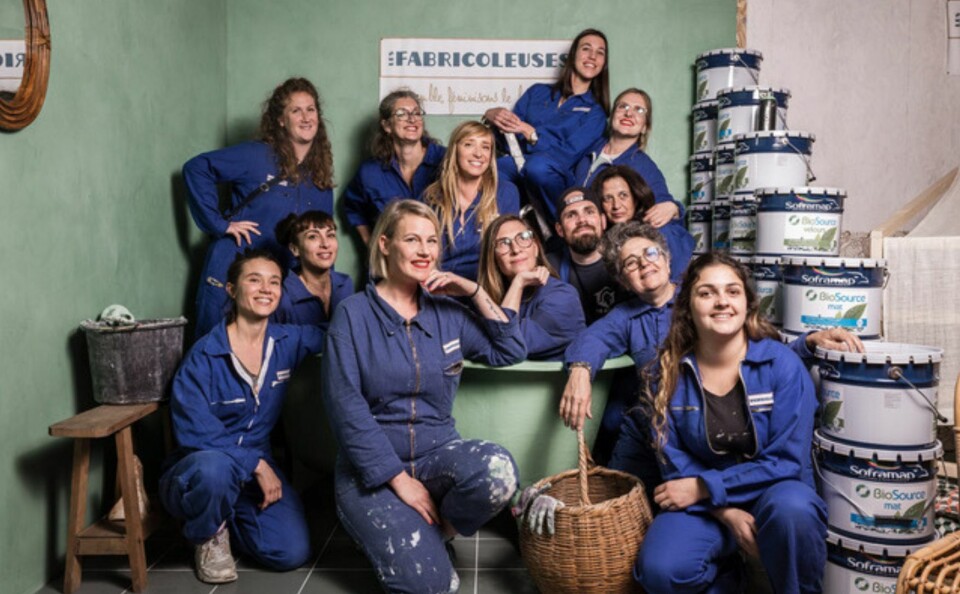-
'I helped restore French cathedrals as a female American stone cutter - despite prejudice'
Stella Cheng, who worked on the restoration of Notre-Dame Cathedral, faced sexism and racism
-
French woman named one of world’s best teachers
Céline Haller, inspired by English and US teaching methods, has gained recognition for revolutionising learning with hands-on projects and inclusivity
-
What does a maître cirier do in France?
Exploring an ancient craft form at a company founded 120 years ago
‘My aim is to improve France’s building trade by training more women’
A Marseille-based painter and decorator explains her plans to change the image of construction trades and encourage women to join

The French building industry needs to undergo an equality revolution and be regarded as a ‘noble’ profession once again, says the founder of a movement working to bring more women into the trade.
Marseille-based painter and decorator Cerise Steiner, 43, is the driving force behind Les Fabricoleuses, a group that aims to enhance the profile of the industry.
“If an eight-year-old girl says ‘I’m going to be a house painter, I’m going to be an electrician, I’m going to be a plumber’, the parents’ immediate reaction is ‘no, you’re going to take your general baccalauréat exam first and then we’ll see’,” Ms Steiner told The Connexion.
“We have to stop denigrating this business, which is noble and praiseworthy.”
‘I’m fighting all the stereotypes’
Her ultimate goal is to educate tradesmen about how to work with women and teach both sexes to work together.
“We’ve been hearing about gender diversity for a few years now,” she said.
“I hope one day we won’t even be talking about it any more. I’m fighting all the stereotypes. I don’t care if you’re a man or a woman. If you do what you love and have the abilities and skills, let’s go for it.
“There are men who do very well in front of a computer but would be incapable of carrying loads like my female painters.”
Women employed by women also have a 90% chance of being paid for their skills, rather than gender, and face far fewer instances of harassment, Ms Steiner said.
Read more: A French perspective on sexism
There are advantages for customers too
Single women and older clients actively prefer being offered a choice of either female or male tradespeople. “Couples don’t really care as long as the work is done well,” she said.
When asked if customers expect a lower rate from women builders, she said it happens occasionally, but added: “The main thing is to stop haggling.
“When you go into a restaurant, you don’t start asking for a discount on the meat or a little bit off the coffee.”
There were signs of change in the building industry before Les Fabricoleuses.
The French Building Federation began to promote feminisation in 2006.
“It even launched a campaign about it, which I don’t think went far enough,” said Ms Steiner.
“Today, just 1.6% of building site workers are women. In five years’ time, I hope to increase that to 3%.”
Read more: How can I enrol for adult evening classes in France?
At first it was a group of women DIY enthusiasts
The former cultural events manager, who had always had an affinity for painting, switched careers to land a job on a building site on the eve of her 40th birthday.
An “astonished in a good way” co-worker planted a seed when he admitted it would be “complicated” to achieve his ambition of training a female plumber.
“The next morning, I woke up with the idea of bringing together women’s know-how,” Ms Steiner said.
“In the beginning, it was just a collective of women DIY enthusiasts. It took, almost to the day, nine months to bring the femmes bricoleuses into the world.”
The multi-phase Les Fabricoleuses movement combines an inclusive, incubating network “like the LinkedIn of women in construction”.
In phase two, roll-out in 2024, holistic support, from admin to legal, sales and wellbeing, will be offered.
The coming weeks will also see the launch of the third phase of the project: the maison des bricoleuses, or DIY house.
Instead of cleaning jobs women can work on building sites
Located in Marseille and containing three floors, it is a “place of re-use and local creation”, Ms Steiner said, featuring a drop-in centre for integration, retraining and post-creation support. There will be opportunities for older women too.
“I set up this project with a strong solidarity angle,” she said.
“All these women who find themselves out of work, for example, because clothing retailer Camaïeu has gone bankrupt or supermarkets are using automated tills. What are they going to do?
“Instead of offering them a job as a cleaner or canteen assistant, I would like to take them on work experience on building sites or via our female network.
“If they like it, we can find them training and they can join the building industry.”
Related articles
‘I tell women to be bold, no field is out of bounds’
Mimie Mathy: French TV star who turned disability into a driving force
‘I am learning to read at 43 after running my own business for years’
























